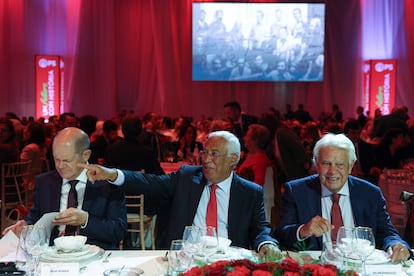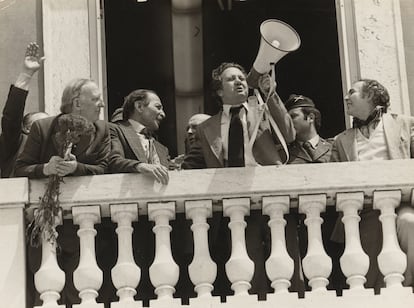50 years of the Portuguese Socialist Party: from underground activists to stalwarts of European social democracy
Founded by Mário Soares in 1973, the party is the backbone of Portugal’s democracy – but celebrates half a century of existence in the midst of political turmoil


In the space of just two years, they went from being a group of activists who could fit on a single bus, to representing the backbone of Portugal’s new democracy. Not even an inveterate optimist like Mário Soares – the nation’s former prime minister and president, and the father of modern Portuguese socialism – could have imagined how much they would achieve. However, Portugal’s Socialist Party (PS) celebrates its 50th anniversary at a time of acute adversity, amid constant demonstrations over the Portuguese middle classes’ deteriorating quality of life. The governing party has a comfortable majority in the country’s parliament, but its mistakes are causing it to come under fire on an almost daily basis. That has included clips around the ear from the president, Marcelo Rebelo de Sousa, who had enjoyed a harmonious relationship with the prime minister, António Costa, but now roundly criticizes many of his decisions, such as the measures he has adopted on housing.
In just a year, the Portuguese government has racked up several scandals brought about by failed appointments, and right now is in the eye of the storm over its management of TAP, Portugal’s flag carrier, following the airline’s nationalization. A parliamentary inquiry was launched in February. “After seven years in government, [the PS] is showing signs of wear and tear,” says António Costa Pinto, a sociologist and historian at the University of Lisbon, in an email. “But it is still the party that is at the heart of Portugal’s democracy, particularly because now, with the growth of Chega, a far-fight populist party, the chief center-right party, the PSD, also has a considerable challenge on its hands.”
So much has changed since the PS was founded in 1973, at a home in the small Rhineland town of Bad Münstereifel. Germany’s Friedrich Ebert Foundation played a key role in the party’s creation, carried out in complete secrecy to avoid reprisals from Portugal’s dictatorship, which had banned political parties in 1933 and, 40 years later, maintained that prohibition. The Germans paid the travel costs of the small group of Portuguese activists, who met to decide whether to turn the Portuguese Socialist Action, a movement founded by Soares in Geneva in 1964, into a political party. Those who had come from Lisbon opposed the move – including Soares’ wife, Maria Barroso, who voted against her husband. Soares, who had gone into self-imposed exile in Paris after receiving death threats for publicly opposing Portugal’s colonial wars, was almost alone in insisting that the dictatorship of Marcelo Caetano, who had succeeded António de Oliveira Salazar in 1968, would fall imminently. Soares’ side of the vote won out, and he was named the PS’ first secretary-general.
“Until a socialist party appeared, the dictatorship would say ‘between us and the communists, there’s nothing’, and the communists would say ‘between us and the fascists, there’s nothing’,” explains José Manuel dos Santos, a former advisor to Soares who coordinated the events marking the party’s 50th birthday. “That’s a terrible state of affairs, because it strengthened the dictatorship. After the Second World War, the West as a whole closed its eyes to the two dictatorships in the Iberian Peninsula, because the major source of fear during the Cold War was communism. Soares saw that the only way to break that vicious cycle was to create a new organization, which started out as the Socialist Action and then became the Socialist Party.”
What Soares couldn’t predict was the exact moment of the regime’s downfall. On the day of the Carnation Revolution, he was in Bonn to meet Willy Brandt, the German social-democrat who was a major source of support to Soares and Spain’s Felipe González, another Iberian socialist leader who emerged to capitalize on regime change at the ballot box. After returning to Paris, Soares then boarded the train that became known as the “Comboio da Liberdade” (“Freedom Train”) – and, on 28 April 1974, he arrived back in Lisbon. “We called for immediate elections and proposed Mário as our member of parliament. We only expected to get one,” recalls António Campos, one of the Socialist Party’s founders, in the television documentary 50 years of the PS: German roots, which was aired by Portugal’s state broadcaster RTP. Constituent elections were held two years later, and the PS was the most-voted party, winning 116 seats – one more than its total number of founding members in 1973.

The world, the country and the party have changed radically over the past 50 years. Despite their divisions, such as the conflict witnessed between Jorge Sampaio and António Guterres, Portugal’s socialists have resisted the crisis of social democracy better than other European counterparts, and the party’s governments have spent a combined total of 25 years in power – half of the country’s period of democracy. “The Portuguese Socialist Party has always had a Communist Party to its left with greater electoral clout than most European democracies and, since the start of the 21st century, it has also had the radical-left Bloco de Esquerda, the Portuguese equivalent to Spain’s Podemos,” Costa Pinto observes. “Despite being at the center of the biggest case of corruption in Portugal’s democracy, with the accusations against the former prime minister, José Sócrates, the party has still done well electorally.”
In the wake of the Sócrates scandal, the Socialist Party moved into opposition, before returning to power against all expectations. In 2015, PS leader Costa agreed a deal with the party’s rivals on the left to table a motion of no confidence that removed the conservative prime minister, Pedro Passos Coelho, who had been elected by only a slim margin. And in 2022, again defying the odds, Costa achieved a historic absolute majority that gave his party greater executive power than any other within the European social-democratic family right now. Of the seven governments in which the left is represented, only two have an absolute majority: Malta and Portugal’s. In the five other countries – Germany, Denmark, Slovenia, Romania and Spain – they are part of coalition administrations. Europe’s political map is dominated by the center-right, with populism and extremism making increasing inroads.
Barrier against extremism
In Portugal, the Socialist Party presents itself as the chief barrier against the extremism of André Ventura, the leader of Chega. And that, in the opinion of analysts, was one of the chief factors behind the PS’ landslide election win last year. It’s a mission that Costa pointed to when he spoke at Wednesday’s 50th-anniversary event in Lisbon. The German chancellor, Olaf Scholz, was in attendance, as was former Spanish prime minister González, who was alongside Soares for the moment when Spain and Portugal joined the European Economic Community. “Today, there may be a different war, different battle lines drawn, but we’ll always be faced with a war,” Costa said, in a speech in which he touted the legacy of socialist policies in Portugal (such as the national health service, state education and welfare assistance). “Today there is no dictatorship, but there is a growth in populism that we must fight.”
The celebrations, however, have also fanned the flames of internal discontent. Former socialist chiefs have in recent days criticized Costa’s leadership, accusing him of moving away from the founders’ values of solidarity and freedom. Perhaps the headline that best sums up the complex times the PS finds itself in was written by Ana Sá Lopes of the Portuguese newspaper Público: “50th-birthday blues.”
Sign up for our weekly newsletter to get more English-language news coverage from EL PAÍS USA Edition
Tu suscripción se está usando en otro dispositivo
¿Quieres añadir otro usuario a tu suscripción?
Si continúas leyendo en este dispositivo, no se podrá leer en el otro.
FlechaTu suscripción se está usando en otro dispositivo y solo puedes acceder a EL PAÍS desde un dispositivo a la vez.
Si quieres compartir tu cuenta, cambia tu suscripción a la modalidad Premium, así podrás añadir otro usuario. Cada uno accederá con su propia cuenta de email, lo que os permitirá personalizar vuestra experiencia en EL PAÍS.
¿Tienes una suscripción de empresa? Accede aquí para contratar más cuentas.
En el caso de no saber quién está usando tu cuenta, te recomendamos cambiar tu contraseña aquí.
Si decides continuar compartiendo tu cuenta, este mensaje se mostrará en tu dispositivo y en el de la otra persona que está usando tu cuenta de forma indefinida, afectando a tu experiencia de lectura. Puedes consultar aquí los términos y condiciones de la suscripción digital.








































